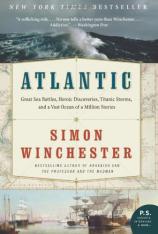Atlantic: Great Sea Battles, Heroic Discoveries, Titanic Storms, and a Vast Ocean of a Million Stories
Review
Atlantic: Great Sea Battles, Heroic Discoveries, Titanic Storms, and a Vast Ocean of a Million Stories
“Men might as well project a voyage to the Moon as attempt to employ steam navigation against the stormy North Atlantic Ocean.”
– Dionysius Lardner, Irish scientific writer and lecturer, 1793-1859
This quote opens Simon Winchester’s latest book, ATLANTIC. The bestselling author of KRAKATOA and THE PROFESSOR AND THE MADMAN has made a career of turning nonfiction accounts into page-turning literature. Now he is taking on the vast infinity that is the Atlantic Ocean in a work that reads like crisp fiction as it covers this immense space through a number of different themes, blending both fact and folklore along the way.
What gives the book even more poignancy is how Winchester interjects his personal experiences into the numerous references he provides regarding the great Atlantic Ocean. Once nicknamed “the pond” by Victorian sailors of the 1600s, this body of water has been the site of famous events and the inspiration for thousands of artistic and literary productions.
Early on in the preface, Winchester mentions the Atlantic Charter of 1941. U.S. President Franklin D. Roosevelt and British Prime Minister Winston Churchill signed the accord that signaled a changing of the guard, with the United States taking over from Britain as titular leader of the Western world. Winchester also refers to the Atlantic Ocean as a body of water that geologists predict will continue to transform in shape and size dramatically. Because of all the change that has taken place with the ocean over thousands of years, it is a reasonable subject that can have its story told in the form of biography.
Winchester indicates that the origins of the Atlantic can be traced as far back as the Jurassic period 195 million years ago. However, it was not until the age of early aquatic explorers that this mighty ocean was discovered and recognized. The voyages of Italian explorer Christopher Columbus are well known. Yet the first European to cross the Atlantic and reach the New World was actually a Norse Viking, most likely from Norway. Prior to Columbus reaching the New World, Florentine navigator Amerigo Vespucci was the first to realize North America as a continent and the Atlantic as a discrete and separate body of water --- an ocean.
Details of the great ships that crossed the Atlantic are covered at length by Winchester, with particular attention given to the HMS Challenger. Initially a warship, the Challenger not only traversed the Atlantic visiting numerous ports along the way but also carried a team of scientists and geologists during its initial three-and-a-half-year voyage. The findings of these men of science included the discovery of hundreds of specimens --- both animal and plant --- many of which still exist today. This was a formidable intellectual achievement that opened up the world and was the most comprehensive study of an ocean ever undertaken.
ATLANTIC provides proof of the indelible inspiration the Atlantic Ocean has made in the areas of arts and literature. Thousands of poems, stories and artistic achievements claim the ocean as their muse. Among Winchester’s references are the Anglo-Saxon poem “The Seafarer” and numerous writings by the great William Shakespeare that provide some of the first Atlantic-inspired literary works. Architecture along the thousands of Atlantic coastline areas also represents respect for the sea. French composer Claude Debussy titled three of his major works “La mer,” which helped attach the word “Impressionism” to a new style of sea-centered music. Winchester also points out several famous pieces of art, with none more notable than those of English artist J.M.W. Turner, whose “The Wreck of the Minotaur” exemplified the power of the great Atlantic Ocean.
No story of the Atlantic would be complete without outlining the role this body of water has played in the war experience. The Portuguese, the French, the Dutch and the English all sailed ships across the Atlantic during colonization efforts with the intent on beating their opponents to new territories. Winchester regales us with the golden age of pirates on the Atlantic, a term that originated from the Caribbean references to buccaneers and privateers. Writers like Robert Louis Stevenson and Daniel Defoe told of the exploits of these infamous traverses and villains of the Atlantic.
What Simon Winchester does best is to make his biography of the Atlantic Ocean read like a compelling fictional narrative that is never dull. In the hands of a writer with his gifts and talent for phraseology, what could have been an antiseptic textbook type of read is instead an exciting and enthralling literary experience that will appeal to anyone who is interested in history and engaging storytelling.
Reviewed by Ray Palen on October 31, 2011
Atlantic: Great Sea Battles, Heroic Discoveries, Titanic Storms, and a Vast Ocean of a Million Stories
- Publication Date: November 1, 2011
- Genres: History, Nonfiction
- Paperback: 528 pages
- Publisher: Harper Perennial
- ISBN-10: 0061702625
- ISBN-13: 9780061702624





